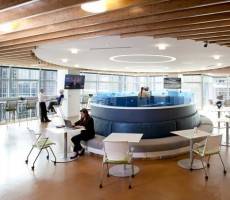September 26, 2014
Generation Y make the most trusting managers, finds ILM report
 Maintaining high levels of trust at work helps to foster an engaged and productive atmosphere, finds a new report by the Institute of Leadership & Management (ILM), which reveals the youngest generation to be the most trusting and those working within the public sector the least trusting. The truth about trust, honesty and integrity at work found that the millennial generation of managers (born 1981 onwards), are the most likely to trust those within their organisation (54%), followed by baby boomers (born between 1946–1964), almost half of whom (45%) say they trust everyone or almost everyone. Generation X, those born between 1965–1980, had the lowest level of respondents saying they trust everyone or almost everyone (44%) at work. The research also reveals that the five fundamental skills and qualities that leaders need in order to be trusted are openness, effective communication, the ability to make decisions, integrity and competence in their role. (more…)
Maintaining high levels of trust at work helps to foster an engaged and productive atmosphere, finds a new report by the Institute of Leadership & Management (ILM), which reveals the youngest generation to be the most trusting and those working within the public sector the least trusting. The truth about trust, honesty and integrity at work found that the millennial generation of managers (born 1981 onwards), are the most likely to trust those within their organisation (54%), followed by baby boomers (born between 1946–1964), almost half of whom (45%) say they trust everyone or almost everyone. Generation X, those born between 1965–1980, had the lowest level of respondents saying they trust everyone or almost everyone (44%) at work. The research also reveals that the five fundamental skills and qualities that leaders need in order to be trusted are openness, effective communication, the ability to make decisions, integrity and competence in their role. (more…)

























September 25, 2014
Why a more flexible approach to where and when we work is long overdue
by Sara Bean • Comment, Facilities management, Flexible working, News